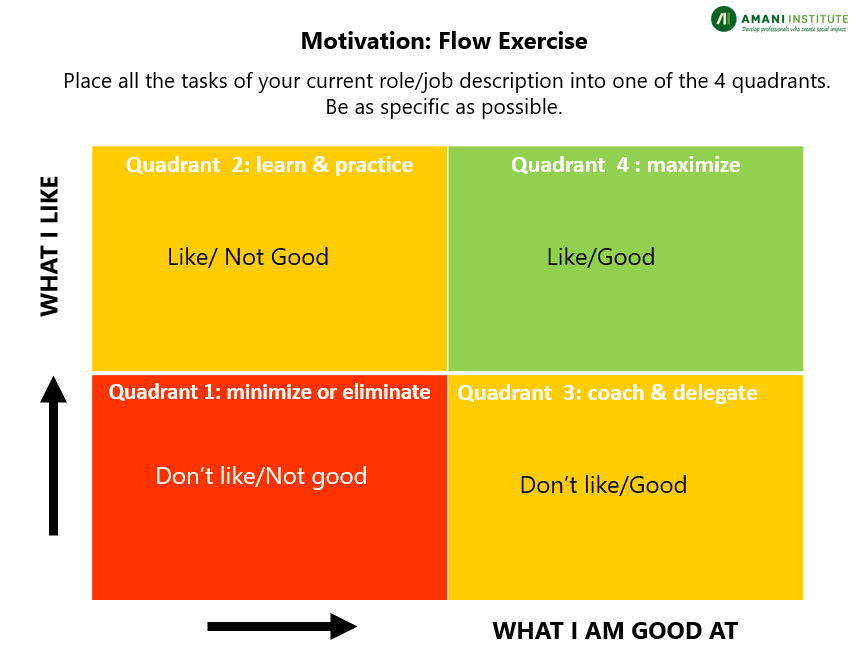February 5, 2018 in Entrepreneur Advice, Talent
I often get asked by entrepreneurs: are there any simple tools or concepts that I can use to help my team tap into its full potential?
Many founders — both early as well as later stage — feel that their team is not living up to its full potential. It manifests in various symptoms: lack of commitment, low individual performance, etc. There is no silver bullet to solve this problem. However, there are a few frameworks that we at Amani Institute find very helpful and use frequently as part of our programs as well as internally. I’ll share them below.
One useful concept is Timothy Gallwey’s simple yet powerful definition that performance (p) is equal to potential (P) minus interference (I), or p = P — I. In other words, without interference performance would equal potential. Interference can manifest in all shapes and forms including: lack of knowledge and skills, lack of drive or motivation, frustration, conflict, etc.
This definition holds true for individuals as well as teams. This raises the question: which detractors or interferences do we need to try to eliminate in our teams? Whenever, performance or the lack thereof comes up in a conversation, I encourage people to explore, if too much interference is the issue that needs to be tackled or if the focus needs to be on building up potential of the team or individual overall. That can give each team leader a starting point for an intervention.
[vilcap_post_cta_links]
When people are experiencing what Mihaly Csikszentmihalyi describes as “Flow” — the mental state of operation in which a person performing an activity is fully immersed in a feeling of energized focus, full involvement, and enjoyment in the process of the activity — the chance of us tapping into our potential as individuals is much higher. One way to do this, is to see how much time we are spending doing tasks that we like doing AND we are good at given our current job description. Working on something that we like doing and we feel have the skill set, gives us energy and we are much more likely to get into a state of flow.

If you spend less than 60% of time in quadrant 4, you may want to find to ways to increase the percentage of time you spend in quadrant 4 activities. You can do this either by reducing energy detractors in quadrant 1 and 2 or by increasing your skills in quadrant 3. You can get your entire team or a specific individual to fill in the matrix, discuss the results and agree on potential action steps.
Another tool we found highly effective for teams and we are using extensively is MBTI. Understanding how one’s MBTI style influences the way we communicate, how we prefer to process information, what we prioritize when making decisions or how we organize our work, helps us understand your own preferences and increases one self-awareness. Having good self-awareness is an essential step towards becoming a high-performer, but is not enough in itself. The ability to flex towards other preferences/styles is key when it comes to working with team mates as well as managing other people.
Within the Amani team, every team member who joins gets introduced to MBTI and we also share how our preferences manifest on a day-to-day basis. In my own case, the fact that I have an extroversion preference means that I do prefer meetings and in-person interaction strongly over email. Which happens to be exactly the opposite for my manager, who has a strong introversion preference. Trying to appreciate different working styles and the objective to consciously flex towards the other person’s preferences, helps us to work together more effectively and it considerably reduces the amount of team conflict. Thus, it’s a good way to remove potential performance interferences on a team level.
Once we manage tap into our full potential — both as individuals and a team and remove or reduce the interferences, it will not just close the performance gap, but it will enable the business to go the next level and lead to better business performance.
Caroline Gertsch is a Country Director at Amani Institute, which aims to develop professionals who create social impact through a new approach to education and talent development. They do this through trainings and programs that focus on practical leadership and management skills needed to for long-term career success.
Our newsletters share the latest about our programs, trends, ecosystem leaders, and innovative entrepreneurs in the impact world. Get the latest insights, right in your inbox by subscribing:
Village Capital needs the contact information you provide to us to contact you about our products and services. You may unsubscribe from these communications at any time. For information on how to unsubscribe, as well as our privacy practices and commitment to protecting your privacy, please review our Privacy Policy.